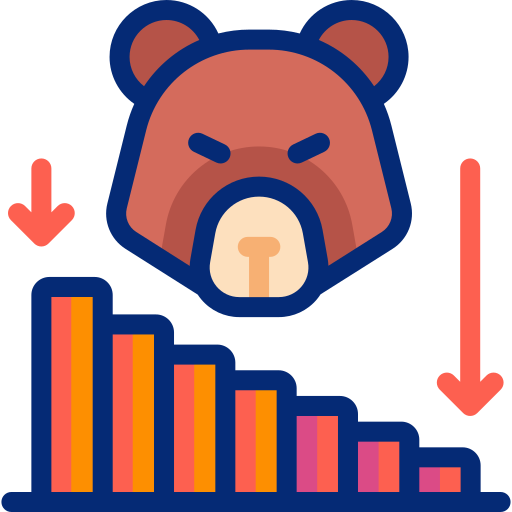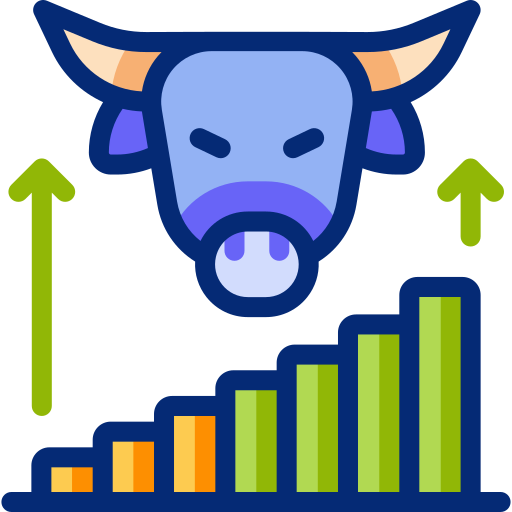Lisa just landed her first full-time job!
She wants to make smart decisions for her financial future and learn about investing.
But when she hears her friends talk about investing in the stock market, she's confused by terms they throw around — like “bull market” and “bear market".

What in the world do these animals have to do with investing?!
If you’re wondering the same thing, you’re in the right place. Let’s break it down!
What Is a Bear Market vs a Bull Market?
The terms bear market and bull market describe the overall trend in the financial markets, particularly stock markets.

Bear Market
What is it?
A market that is declining or expected to decline.
Typically a 20% or more drop in stock prices from recent highs.

Bull Market
What is it?
A market that is rising or is expected to rise.
Sustained price increases, often over months or years.
Why "bear" market?
The name comes from the way a bearattacks — it swipes its paws downward, symbolizing falling prices.
Why "bull" market?
The name comes from the way a bull attacks — it thrusts its horns upward, symbolizing rising prices in the market.
How Bear Markets vs Bull Markets Behave
How Bear Markets Behave
Asset prices (like stocks, real estate, crypto) drop and stay low over time.
Companies earn less profit, and layoffs may increase.
Economic activity slows — spending, hiring, and growth all shrink.
Prices may swing unpredictably (high volatility).
How Bull Markets Behave
Stock prices and other investments rise steadily over time.
Companies grow, hire more people, and make higher profits.
Economic activity shows stable upward momentum.
Prices rise over time because of strong economic performance.
How Investors Behave in Bear Markets vs Bull Markets
Bear Market
People feel anxious or pessimistic about the future.
Many sell off their investments or stop buying more.
Investors shift to “safer” options like bonds or utility stocks (aka defensive investing).
Risk-taking drops, more people play it safe and focus on saving.
Bull Market
People feel confident and optimistic about the future.
Investors are more willing to take risks with their choice of investments.
More money flows into stocks, startups, and trendier investments.
Fear of missing out (FOMO) can drive further investing and increased prices.
Quiz
Which of the following reflects investor sentiment in a bull market?
Bear Market: Historical Example
 Photo by Patrick Hendry on Unsplash
Photo by Patrick Hendry on UnsplashThe Global Financial Crisis of 2007-09
Total decline: the S&P 500 index — a key benchmark for the U.S. stock market — declined by approximately 57% from its peak to its trough.
Key events:
Major banks failed or required government bailouts (e.g., Lehman Brothers collapsed in 2008).
Credit markets froze, and consumer confidence plummeted.
Unemployment soared, and the global economy entered a deep recession.
Quiz
What usually happens to the economy during a bear market?
Bull Market: Historical Example
 Photo by Pablo Heimplatz on Unsplash
Photo by Pablo Heimplatz on UnsplashMarch 2009 – February 2020
Total gain: Over 400% (S&P 500 more than quadrupled)
Duration: Nearly 11 years — the longest bull market in U.S. history
Fueled by:
Low interest rates
Strong corporate earnings
Steady economic growth
Why Does All This Matter to Me?
Understanding bear market vs bull market trends helps you make smarter choices.
In a bear market: You might shift to safer assets, buy undervalued stocks, or hold tight rather than panic sell.
In a bull market: You might invest more aggressively or ride the upward trend.
Knowing where the market stands helps you:
Avoid emotional reactions to short-term drops.
Stay committed to your retirement or wealth-building goals.
Rebalance your portfolio at the right times.
Quiz: What should Lisa do?

Lisa has settled into her job and set aside an emergency fund. She is now wondering about her next financial decision. She's been watching the news and has learned that stock prices have been rising steadily.
Quiz
What kind of market is it, and what should Lisa do?
Take Action
 Photo by Nicholas Cappello on Unsplash
Photo by Nicholas Cappello on UnsplashYour bull market v bear market cheat sheet:
A bear market refers to a period when stock prices fall by 20% or more from recent highs, typically reflecting investor pessimism and economic slowdown.
A bull market refers to a period of rising stock prices, marked by investor optimism, strong economic growth, and increased buying activity.
Learn more with these resources:
Your feedback matters to us.
This Byte helped me better understand the topic.




